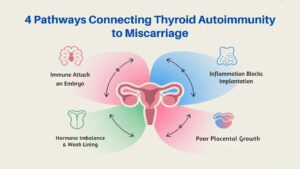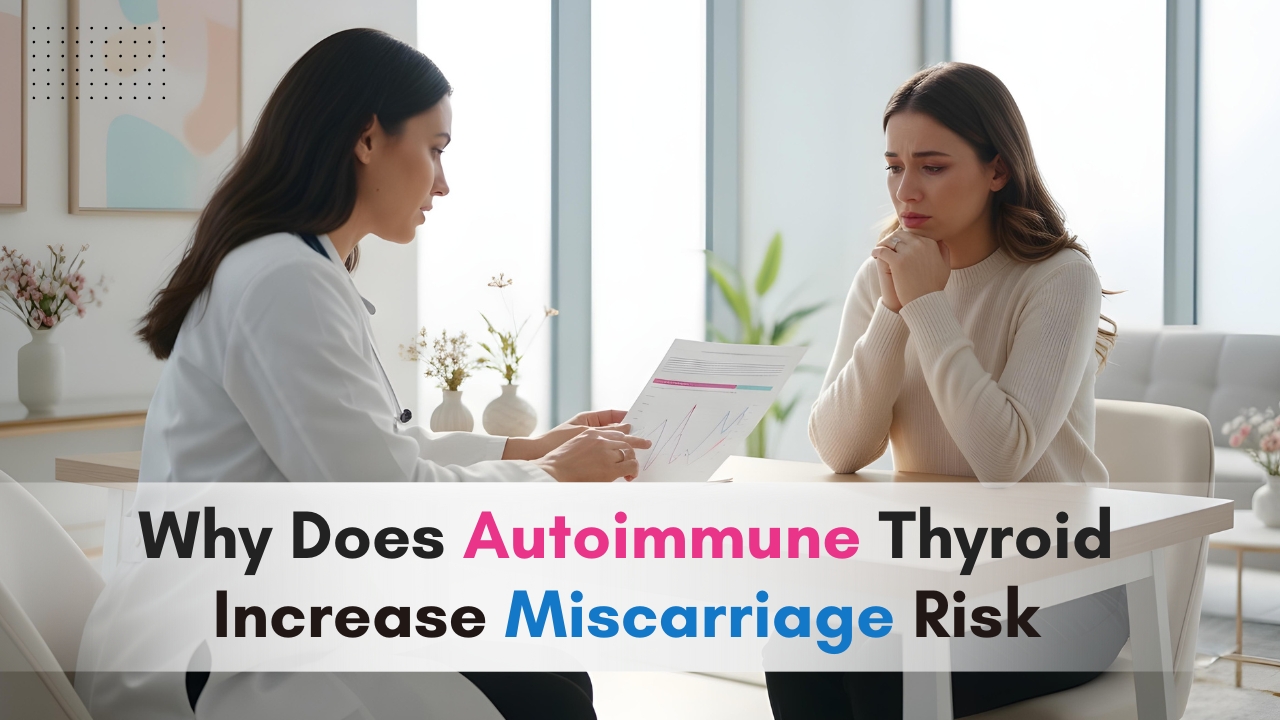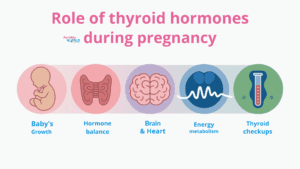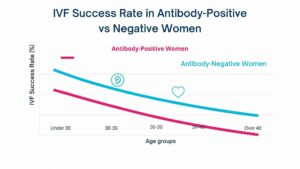It is normal to worry about miscarriage when you have an autoimmune thyroid disease. It’s hard to understand; your body seems to be against you. Autoimmune thyroid problems can mess up hormones that help with early pregnancy, but the risk can be controlled with the right care and close tracking.
We are here to help you if you need help or more information.
Get a free consultation by calling +91 9311850412 or emailing info@fertilityworld.in.
INTRODUCTION
Many women lose pregnancies without realising that their thyroid was the cause. You did everything right: you watched your ovulation, took your supplements, and got enough sleep. But you still had your heart broken. “What’s going on with this?” A lot of people don’t know this: autoimmune thyroid disease and miscarriage are very closely linked. When you have Hashimoto’s or thyroid antibodies, your immune system attacks your thyroid. But that’s not all; it can also affect your uterus, placenta, and embryo implantation, which greatly increases the risk of thyroid problems and early pregnancy loss.
“Does autoimmune thyroid disease affect pregnancy?” Yes, for a lot of women. There are real dangers to getting pregnant with Hashimoto’s disease, thyroid antibodies, and other problems, but they were only found out after a lot of miscarriages. If you’ve had miscarriages that you can’t explain, your thyroid might contain the answers. Understanding the connection between autoimmune thyroid disease and miscarriage could change how you try to get pregnant and stay healthy. Let’s talk about why this happens and what you can do to stop it.
What Is Autoimmune Thyroid Disease (AITD)?
The meaning of autoimmune thyroid disease is simple: your immune system targets your own thyroid gland instead of protecting you. What does autoimmune thyroid disease do? It’s causing inflammation that stops the body from making hormones, which are important for metabolism, ovulation, and pregnancy. AITD stands for Autoimmune Thyroid Disease. This disease causes your thyroid’s immune system to attack itself all the time, which can damage fertility and prevent a healthy pregnancy.
Definition and Types of Autoimmune Thyroid Disease (AITD)
There are two primary forms of autoimmune thyroid disease:
- Hashimoto’s thyroiditis- The most frequent type. Hashimoto’s disease causes your immune system to attack thyroid cells, which leads to hypothyroidism, or an underactive thyroid. A lack of hormones can slow down your metabolism, make your ovulation unpredictable, and raise your chance of miscarriage. Usually found out only through blood tests or after a miscarriage.
- Graves’ Disease- Graves’ disease causes hyperthyroidism, which is when the thyroid is overactive. Antibodies from Graves’ disease make your thyroid work too hard, which makes your body have too much hormone. This leads to problems with pregnancy, missed periods, and implantation failure. Hashimoto’s and Graves’ are different because one slows down your thyroid and the other speeds it up. However, both cause an thyroid hormone imbalance that might impact fertility.
Key Thyroid Antibodies Involved
Thyroid antibodies attack different parts of your thyroid. These can be found early with a thyroid antibody test:
| Antibody | Full Name | What It Does | Pregnancy Impact |
|---|---|---|---|
| TPOAb | Thyroid Peroxidase Antibody | Damages thyroid cells, blocks hormone production | TPOAb and pregnancy loss linked — 2-3x higher miscarriage risk |
| TgAb | Thyroglobulin Antibody | Attacks thyroglobulin, affects hormone synthesis | Early pregnancy complications, implantation failure |
| TRAb | TSH Receptor Antibody | Stimulates or blocks thyroid hormones | Can cross placenta, affect baby’s thyroid (Graves’ disease) |
How autoantibodies attack thyroid tissue: They attack by marking thyroid cells for death, which leads to long-term inflammation and scarring. This same immune system overactivity impacts your reproductive system. Many women with autoimmune thyroid disease exhibit symptoms like tiredness, weight fluctuations, and irregular periods. However, other women don’t have any symptoms until they try to get pregnant.
How the Thyroid Supports a Healthy Pregnancy
Your thyroid might appear small, but it is very important for your baby’s growth and development throughout pregnancy. The appropriate amount of T3 and T4 thyroid hormones during pregnancy keeps your metabolism, energy, and cell division running smoothly. All of these things help your kid develop strong and healthy. Do you want to know how it helps you and your baby? Let’s make things simple.
- It helps your baby grow quickly: Your baby’s thyroid doesn’t start working until a few weeks after birth, so they rely on your T3 and T4 hormones to help their brain and organs grow.
- It makes your hormones balance so you can get pregnant. Want to have a baby? Before and during early pregnancy, keeping TSH levels below 2.5 mIU/L helps your body get ready for implantation for a healthy start.
- It helps the brain and heart of the baby grow: The thyroid hormones throughout pregnancy help the baby’s brain, heart, and nervous system develop correctly. These initial few weeks are highly important for all that comes after.
- It controls your metabolism and energy: Have you ever felt more fatigued or low on energy? The thyroid manages how your body uses energy for both you and your growing baby.
- It needs attention on a regular basis: Are you worried that your thyroid isn’t working right? A simple blood test for TSH and thyroid antibodies will tell you early on what the problem is, so you can take action before it gets worse.
With the right care, balanced hormones, and a bit of self-kindness, your body can create the perfect environment for your baby to grow healthy and strong.
How Autoimmune Thyroid Disease Increases Miscarriage Risk
If your immune system works right, it keeps you from getting sick. But in autoimmune thyroid disease (AITD), the same system can get mixed up and target healthy thyroid cells. This can even impair early pregnancy. This immune reaction that is too strong might cause thyroid antibodies, abnormalities in hormones, and an increased chance of miscarriage or failure to implant. Let’s break it down in simple terms.
1. Immune System Attacks the Embryo
People with Hashimoto’s thyroiditis or Graves’ disease have an immune system that is “hyper-alert.” When thyroid antibodies like TPOAb (Thyroid Peroxidase Antibodies) are strong, the same immune cells that fight the thyroid can also harm the embryo or placenta that is growing.
- These antibodies can make it harder for an egg to implant.
- They can make you lose your pregnancy early, before the heartbeat starts.
2. Inflammatory Cytokines Disrupt Implantation
When inflammatory cytokines, such as TNF-α and IL-6, rise because of autoimmunity, the uterus is less open to getting pregnant.
- During pregnancy, inflammation hurts the lining of the uterus.
- In the event that early implantation doesn’t continue, this can cause biochemical pregnancies or immune thyroid and implantation failure after IVF.
| Immune Factor | Effect on Pregnancy |
|---|---|
| TNF-α, IL-6 | Causes inflammation and hinders implantation |
| TPOAb, TgAb | Damages embryo and uterine cells |

3. Hormone Imbalance and Luteal Phase Defect
When you have autoimmune thyroiditis, your thyroid hormone levels (T3, T4) are often low. When this happens, the hormone progesterone drops. Progesterone makes the uterus lining thicker and stronger.
- When this happens, the uterus isn’t fully ready for implantation. This is known as a luteal phase flaw.
- It makes the chance of having a biochemical pregnancy or an early loss higher.
A Without enough hormone support, the body might not be able to keep the pregnancy going even if it does happen.
4. Poor Placental Development
Thyroid hormones must be in balance, and the immune system must be calm for the placenta to grow properly. In autoimmune thyroid disease, the placenta’s blood flow can be slowed down by improper immune signals.
- It can cause losses in the first trimester.
- It may also slow the growth of the fetus or lead to problems later in the pregnancy.
| Problem | Result |
|---|---|
| High thyroid antibodies | Poor blood flow to the placenta |
| Autoimmune inflammation | Weak placental attachment |
What Research Says — Evidence Linking Thyroid Antibodies to Miscarriage
Thyroid antibodies can quietly raise the chance of miscarriage, even if thyroid hormone levels look fine, according to many studies. For example, TPOAb antibodies show that the immune system is a little too active, which can change how the body promotes early pregnancy. Simply put, this is what the study tells us. Just think about what this means to you.
| Study | Finding |
|---|---|
| Stagnaro-Green, 2011 | Women with TPO antibodies had 2–3× higher miscarriage rates. |
| Negro et al., 2016 | Levothyroxine treatment reduced miscarriage risk by 52%. |
| Meta-Analysis, 2020 | Thyroid autoimmunity linked to higher miscarriage and preterm birth even with normal TSH. |
People with Hashimoto’s thyroiditis, chronic hypothyroidism, or high thyroid antibodies may need extra help to get pregnant. Your chances of a healthy pregnancy can go up a lot if you get easy blood tests, have your thyroid checked early on, and gently balance your hormones.
Symptoms of Autoimmune Thyroid Disease in Women
Although your thyroid is small, your whole body knows when it’s not working right. Asthmatic thyroid disease (Gastric disease) is when your immune system attacks the thyroid, which can either slow it down (Hashimoto’s disease) or speed it up (Graves’ disease). Changes like these can happen slowly and produce symptoms that are often mistaken for signs of stress or tiredness.
| Hypothyroid (Hashimoto’s) | Hyperthyroid (Graves’) |
|---|---|
| Feeling tired all the time, gaining weight easily | Feeling anxious or restless, sudden weight loss |
| Hair thinning, dry skin, always feeling cold | Sweating, racing heartbeat, shaky hands |
| Irregular or heavy periods | Trouble sleeping, mood swings |
| Low mood or depression | Feeling overheated and jittery |
So-called subclinical thyroid autoimmunity happens when thyroid problems aren’t easily seen in blood tests. Although your TSH levels may be normal, having positive thyroid antibodies can still make it harder to get pregnant or have a miscarriage. Check your thyroid if you’ve been feeling “off”—tired but can’t sleep, gaining or dropping weight for no reason, or noticing changes in your mood or periods. The right diagnosis can aid in understanding and easing symptoms.
Diagnosis — Detecting Autoimmune Thyroid Before Pregnancy
Before you start trying to get pregnant, whether naturally or through IVF, you need to make sure your thyroid is healthy. Although it’s small, the thyroid is very important for controlling your metabolism, hormones, and pregnancy. Many women do not know that even small problems with their thyroids or the presence of thyroid antibodies can quietly stop them from ovulating, implantation of the egg, and getting pregnant early.
So, before starting treatment, doctors often say to get a thyroid pregnancy test or a thyroid and miscarriage panel. This kind of testing can find problems that regular checkups might miss. If problems are found early, your fertility expert can treat them before they make it harder to get pregnant or raise the risk of miscarriage.
| Test | Purpose | Normal Range |
|---|---|---|
| TSH | Basic thyroid function screening | 0.5–2.5 mIU/L |
| Free T4 & Free T3 | Measures active thyroid hormones for energy and metabolism | Within normal range |
| TPOAb / TgAb | Detects autoimmune thyroid antibodies linked to miscarriage or IVF failure | Should be negative |
| TRAb | Checks for Graves’ disease (hyperactive thyroid) | <1.75 IU/L |
Don’t give up if your TPO test or thyroid antibody test comes back positive before IVF. It only means your thyroid needs a little extra care. It doesn’t mean you can’t get pregnant. Taking simple medicines like levothyroxine, eating right, and getting regular checkups are what most women need to have healthy, happy pregnancies.
How Autoimmune Thyroid Affects IVF Success
How well your body responds to IVF treatment may depend on how healthy your thyroid is. Many women don’t know they have thyroid antibodies like TPO antibodies (TPOAb) or TgAb. These antibodies are mostly common in Hashimoto’s thyroiditis and also affect IVF success rates by making it unbalanced in your body’s needs for healthy egg and embryo development.
Thyroid antibody-positive women often have problems, like bad egg quality, slower baby growth, or problems with implantation, even when their thyroid hormone levels are normal. The immune system gets a little too busy, which isn’t harmful but makes the uterine environment less favourable for implantation.
The good news is that these problems can be fixed. Researchers have found that giving women with autoimmune thyroid disease thyroid medicine like low-dose Synthroid or gentle immune therapy before they try IVF can greatly increase their chances of success. It helps keep hormones in balance, protects the health of the embryo, and lowers the risk of miscarriage.
Having thyroid antibodies doesn’t mean that IVF won’t work. You can have just as good a chance of getting pregnant as someone who doesn’t have thyroid problems if you get tested early, get the right thyroid and fertility care, and are closely watched.
Treatment and Management to Reduce Miscarriage Risk
Good news: if you have high thyroid antibodies or inflammatory thyroid disease, you can handle it. The risk of miscarriage can be lowered, and the chances of a healthy baby can be raised with the right care and treatment. In easy, everyday language, this is how doctors usually treat thyroid problems before getting pregnant.
1. Levothyroxine (Thyroid Hormone Therapy)
Levothyroxine, a safe thyroid hormone replacement, is the most common way to treat it. While supporting healthy embryo growth, it helps bring TSH levels back to normal.
Levothyroxine for thyroid antibodies has been shown to reduce the risk of miscarriage in women with autoimmune thyroid disorders, even when their thyroid hormone levels are within the normal range.
| Purpose | Effect |
|---|---|
| Restores thyroid balance | Helps implantation and hormone stability |
| Reduces miscarriage risk | Especially in antibody-positive women |
| Safe for pregnancy | Monitored regularly by doctors |
2. Selenium Supplementation
Selenium is a strong mineral that helps keep the thyroid healthy and keeps the immune system from being overactive. It lowers TPO antibodies, lowers inflammation, and makes the thyroid work better generally.
It helps in these ways:
- As an antioxidant, it keeps thyroid cells from getting hurt by the immune system.
- It helps to reduce the swelling that comes with chronic thyroiditis.
- Helps the thyroid work better and keep hormones in balance.
- It may even help with ovulation and implantation of embryos in a roundabout way.
Doctors usually say to take 100–200 µg per day, but only with their care because too much can have bad effects. Selenium is like a gentle support for your thyroid. It doesn’t take the place of medicine, but it does help your thyroid stay strong and healthy.
3. Vitamin D Optimization
Women who have thyroid autoimmunity and have trouble getting pregnant often have low amounts of vitamin D. Vitamin D levels above 30 ng/mL help keep hormones in balance, keep the immune system healthy, and help embryos implant.
- Helps the defence system work well.
- Lowers inflammation caused by autoimmunity.
- Helps both the thyroid work better and the pregnancy go better.
Getting some sun, eating well, and taking vitamins (if you need them) can make you feel better on the inside and out.
4. Anti-Inflammatory Diet and Lifestyle
The things you do every day are just as important as the medicine you take. Your thyroid and body can both do well with a healthy, anti-inflammatory diet and lifestyle.
| Do’s | Don’ts |
|---|---|
| Eat leafy greens, nuts, seeds, and omega-3-rich foods | Avoid processed foods and refined sugar |
| Practice stress relief — yoga, deep breathing, or light walks | Don’t skip sleep or overwork your body |
| Stay hydrated and keep a healthy routine | Avoid smoking, alcohol, and excess caffeine |
Preventing Miscarriage in Thyroid Autoimmunity
Early treatment is very important for women with thyroid antibodies or autoimmune thyroid disease to avoid problems. Ensuring proper thyroid function before getting pregnant and maintaining healthy hormone levels can help avoid miscarriages, boost implantation, and support a healthy baby. Simply follow this list before and during your pregnancy
- Perform a thyroid and antibody test before trying to get pregnant or using IVF to find thyroid problems early on.
- Maintain TSH levels between 1 and 2.5 mIU/L for better embryo growth and implantation.
- Treatment should be given to women who test positive for antibodies, even if their thyroid levels look normal.
- For balance, take the thyroid medicine given to you during pregnancy (Levothyroxine).
- During pregnancy, check the thyroid activity every 4 to 6 weeks.
- Give your doctor-recommended Vitamin D and selenium pills to help keep your thyroid healthy.
- Following an anti-inflammatory diet will lower immune system responses.
- Controlling inflammation means staying away from processed foods, gluten, and too much sugar.
- Stay hydrated and also maintain a healthy weight for better hormone function.
- You need to keep your hormones in balance, which can be done by sleeping at least 7–8 hours every night.
- Manage stress with yoga, meditation, or light walks to balance the immune system.
- If you want to improve your thyroid and fertility, don’t smoke, drink booze, or caffeinate.
- Work closely with your doctor for thyroid treatment adjustments in each trimester.
Think positively—thyroid antibodies and the risk of miscarriage can be handled well with the right care.
Emotional Aspect — Coping with Thyroid-Related Pregnancy Loss
When you lose a pregnancy, it alters you in a way that words can’t entirely convey. When it develops because of thyroid problems, it can be even more puzzling. You start to doubt your body, ask yourself what went wrong, or blame yourself for things that were never your fault. But please believe me when I say that none of this is your fault.
Autoimmune thyroid conditions can affect your energy, your mood, and even the way you see yourself. That’s why it’s important to take care of your emotional health too. Talk to someone — a therapist, your partner, or another woman who’s been through this. Sometimes, just being heard can help you breathe again.
You don’t have to hurry your recovery. Take your time and grieve in your own way.
Final Thoughts
Autoimmune thyroid disorders don’t just affect your neck gland, they touch every part of your reproductive journey. From ovulation to implantation, your thyroid quietly guides each step. When it’s out of balance, it can lead to challenges like autoimmune thyroid and miscarriage, but the good news is — with the right thyroid pregnancy care, most women go on to have completely healthy pregnancies.
Have you tested your thyroid recently? Sometimes, a small test and timely treatment are all it takes to protect your dream of becoming a parent. At Fertility World IVF Centre, we help you understand your body better, balance your hormones, and strengthen your immune system so that your next chapter begins with confidence and care.
Book your Thyroid and Fertility Consultation at Fertility World today.
Can thyroid autoimmunity affect pregnancy even with normal TSH?
Yes. Thyroid autoimmunity can throw off the immune system's balance, even if TSH levels are normal, and lower the success rates of IVF and implantation. That's why it's important to get a thyroid antibody test before getting pregnant.
How to treat Hashimoto’s before pregnancy?
For stabilizing TSH levels and lowering antibody effects, doctors generally suggest Levothyroxine (thyroid hormone therapy). Additional doses of selenium and vitamin D can also help keep the immune system and thyroid in balance.
Do thyroid antibodies go away after treatment?
They might not go away completely, but with the right care, a healthy diet, and vitamins, thyroid antibody levels can be lowered and inflammation can be reduced.
Can selenium and Vitamin D lower thyroid antibodies?
Yes, research shows that getting 100–200 µg of selenium and 30 or more ng/mL of vitamin D every day can help lower TPO antibodies and keep the thyroid working well during pregnancy and conception.





